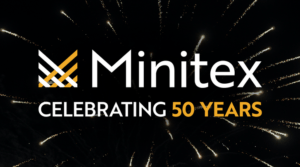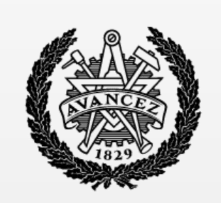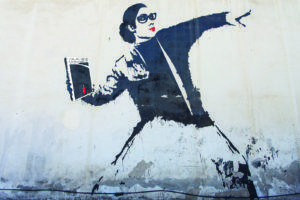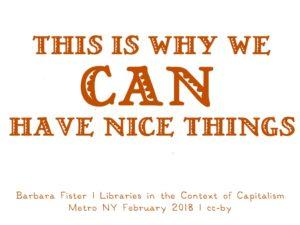 I was invited to speak to librarians at the Lake Superior Library Symposium, a gathering of professionals from all kinds of libraries Up North. Since visiting Duluth is always a good idea, I was happy to be part of the conference program. The theme of the conference was Matter of Fact: Promoting Information Literacy in an Age of Fake News, so I glommed together a lot of thoughts I’ve had about the topic, speaking in particular about the place of libraries in the public sphere, why our values matter, and why it matters that those values haven’t been adopted by Big Tech. (Photo by Garrett Cumber on Unsplash.)
I was invited to speak to librarians at the Lake Superior Library Symposium, a gathering of professionals from all kinds of libraries Up North. Since visiting Duluth is always a good idea, I was happy to be part of the conference program. The theme of the conference was Matter of Fact: Promoting Information Literacy in an Age of Fake News, so I glommed together a lot of thoughts I’ve had about the topic, speaking in particular about the place of libraries in the public sphere, why our values matter, and why it matters that those values haven’t been adopted by Big Tech. (Photo by Garrett Cumber on Unsplash.)
Category: talks
information literacy, writing instruction, and the problem of stochastic parrots
 I was invited to speak to writing instructors at the University of Minnesota, Duluth, who are in the process of thinking through the information literacy portion of their learning outcomes. Always a pleasure to connect with a discipline that seems so closely aligned with academic library work.
I was invited to speak to writing instructors at the University of Minnesota, Duluth, who are in the process of thinking through the information literacy portion of their learning outcomes. Always a pleasure to connect with a discipline that seems so closely aligned with academic library work.
Abstract: For more than three decades, my job was to help students learn how information works. Though information literacy, as we call it, matters to me because inquiry is ideally a form of education that Paolo Freire called “the practice of freedom,” the students I worked with were understandably focused on formulating questions and selecting the kinds of sources that would satisfy their teacher rather than engaging in genuine curiosity. Tellingly, a Project Information Literacy study of recent college graduates found less than a third felt that college prepared them to ask questions of their own. Librarians and writing instructors both face a fundamental tension between our higher goals and the reality of our service roles to other disciplines. Two concepts that seem important but are too often overlooked are first, understanding the underlying ethical moves and commitments that characterize good honest work, whether it’s science, journalism, or an informative TikTok, and second, understanding how information systems shape our experiences, especially now that we no longer simply seek information, it seeks us. Today we’ll explore ways these concepts could be addressed without losing sight of the practical needs of writing instructors and their students to satisfy disciplinary expectations. Continue reading “information literacy, writing instruction, and the problem of stochastic parrots”
the answer is … Minitex
 Minitex, our local library cooperative (consortium? collaboration?) is fifty years old, and I got to speak at a virtual party, where there were videos submitted by member libraries, some speakers, and a fun breakout Jeopardy game where I got a couple right but otherwise made a fool of myself. All in a good cause – cheers for fifty years! And cheers for a well-organized Zoom gathering. Here’s the text of what I said.
Minitex, our local library cooperative (consortium? collaboration?) is fifty years old, and I got to speak at a virtual party, where there were videos submitted by member libraries, some speakers, and a fun breakout Jeopardy game where I got a couple right but otherwise made a fool of myself. All in a good cause – cheers for fifty years! And cheers for a well-organized Zoom gathering. Here’s the text of what I said.
Fifty/Fifty: Drawing on the Past to Envision the Future of Minitex
I’m delighted to be part of this wonderful anniversary celebration. Like all of you, I’ve benefitted immeasurably from Minitex, both as a librarian and as a citizen. My relatively small college library couldn’t possibly afford to provide all the information our students and faculty want. Interlibrary loan is the most public-facing Minitex service our community enjoys, but we also benefit behind the scenes from cataloging training and development, cooperative purchasing of things like tattletape, licensing of databases, ELM (now eLibrary), and recently the Minnesota Library Publishing Project, which several of our faculty embraced for publishing local histories or creating class projects, and so on.
a global look at the social life of misinformation
Updated: What a fun conversation! Under the able moderation by Gus Andrews, we started out with a big-picture discussion of the problem – it’s not just the fault of technology, it’s social, with social media amplifying messages and those tools being used deliberately by political actors. Then we heard from Christopher Tuckwood about how the Sentinel Project uses trusted local figures to squelch false rumors circulating in Burma and East African nations where sectarian or political violence is a risk and from Ashley Westpheling, who works with girls in Dublin to develop information for peers (and in this case, the girls decided to focus on misinformation around reproductive health). It was refreshing to hear about work being done at the grassroots level outside the place we pay so much attention to, the U.S.
Lateral Reading and Information Systems in the Age of Distrust
 This is a talk I prepared for ChALS, a Swedish information literacy conference hosted at Chalmers University. Avancez!
This is a talk I prepared for ChALS, a Swedish information literacy conference hosted at Chalmers University. Avancez!
Thank you for inviting me to be part of this conference, and I appreciate your willingness to listen to an American who has not learned Swedish; my apologies.
I am speaking to you from southern Minnesota, in the north-central United States on land that was taken from the Dakota people of the Očhéthi Šakówiŋ. Following a broken treaty and exile, it was settled by Europeans like my Norwegian grandfather as well as Irish, Germans, Finns, and Swedes. When I grew up I heard stories about pioneers, but not much about what happened to the people whose land was taken. Pioneer stories had a purpose: at best, they taught us the United States was a place many people from different backgrounds could call home. It also was a story about how we took something wild and turned it into farms and cities. Indians were part of a romantic, mythic past, not part of our modern history, or our present society. (Of course, the Indians didn’t disappear. They are still here, like the Sami people.)
Continue reading “Lateral Reading and Information Systems in the Age of Distrust”
reimagining information literacy in the QAnon era
 I’ve thought for years that we need to help students do more than find and use information, we need to help them know where it comes from and what traditions and practices influence it. (I published an article making this argument the year before Mark Zuckerberg scraped the Harvard student directory and made a “hot or not” app that eventually became Facebook, and designed and taught a seminar starting in 2005 that tried to address this notion.) So it’s not a new burr under my saddle, but it has been aggravated by the flourishing of our epistemological crisis. It was honestly kind of exhilarating to draft the first PIL Provocation essay on this theme, using the meta-conspiracy theory QAnon as an example. It fascinates me that “doing the research” and “thinking critically” can lead to … where QAnoners have gone.
I’ve thought for years that we need to help students do more than find and use information, we need to help them know where it comes from and what traditions and practices influence it. (I published an article making this argument the year before Mark Zuckerberg scraped the Harvard student directory and made a “hot or not” app that eventually became Facebook, and designed and taught a seminar starting in 2005 that tried to address this notion.) So it’s not a new burr under my saddle, but it has been aggravated by the flourishing of our epistemological crisis. It was honestly kind of exhilarating to draft the first PIL Provocation essay on this theme, using the meta-conspiracy theory QAnon as an example. It fascinates me that “doing the research” and “thinking critically” can lead to … where QAnoners have gone.
Continue reading “reimagining information literacy in the QAnon era”
the bigot in the machine
 The New York Technical Services Librarians, an organization that has been active since 1923 – imagine all that has happened in tech services since 1923! – invited me to give a talk about bias in algorithms. They quickly got a recording up on their site and I am, more slowly, providing the transcript. Thanks for the invite and all the tech support, NYTSL!
The New York Technical Services Librarians, an organization that has been active since 1923 – imagine all that has happened in tech services since 1923! – invited me to give a talk about bias in algorithms. They quickly got a recording up on their site and I am, more slowly, providing the transcript. Thanks for the invite and all the tech support, NYTSL!
The Bigot in the Machine: Bias in Algorithmic Systems
Abstract: We are living in an “age of algorithms.” Vast quantities of information are collected, sorted, shared, combined, and acted on by proprietary black boxes. These systems use machine learning to build models and make predictions from data sets that may be out of date, incomplete, and biased. We will explore the ways bias creeps into information systems, take a look at how “big data,” artificial intelligence and machine learning often amplify bias unwittingly, and consider how these systems can be deliberately exploited by actors for whom bias is a feature, not a bug. Finally, we’ll discuss ways we can work with our communities to create a more fair and just information environment.
libraries and the practice of freedom in the age of algorithms
 I got to give a talk at ER&L about Project Information Literacy‘s latest study. Here’s the text.
I got to give a talk at ER&L about Project Information Literacy‘s latest study. Here’s the text.
Libraries and the Practice of Freedom in the Age of Algorithm
Abstract: How prepared are librarians, and the students they serve, to navigate technologies that are fundamentally changing how we encounter, evaluate, and create information? In the past decade, a handful of platforms have become powerful information intermediaries that help us search and connect but also are tools to foment disinformation, amplify hate, increase polarization, and compile details of our lives as raw material for persuasion and control. We no longer have to seek information; it seeks us. Project Information Literacy has revealed college students’ lived experience through a series of large-scale research studies. To cap a decade of findings, we conducted a qualitative study that asked students, and faculty who teach them, what they know and how they learn about our current information environment. This talk explores what students have taught us, where education falls short, why it matters, and how time-tested library values – privacy, equity, social responsibility, and education for democracy – can provide a blueprint for creating a socio-technical infrastructure that is more just and equitable in the age of algorithms.
Continue reading “libraries and the practice of freedom in the age of algorithms”
system restore
I was invited to speak to members of PALNI, an organization that has developed an interesting model for “deep collaboration” among libraries at private colleges in Indiana. Here’s the text (also available as a pdf).
 Thanks so much for inviting me to speak to you today. Full confession: I have never watched an entire episode of CSI Anywhere. I turned an episode on years ago but just couldn’t get over the fact that people who do forensic work for police investigations aren’t actually detectives and that few investigations use all that science because it’s too expensive. In fact, I’m such a feminist killjoy that it bugs me that we pretend we have scientists on hand to solve crimes when there are hundreds of thousands of untested rape kits sitting in evidence rooms across the country because DNA testing is too expensive and so many police organizations would rather spend the money on facial recognition systems and predictive policing schemes than on actual crime victims. Which is actually kind of related to what I want to talk about today.
Thanks so much for inviting me to speak to you today. Full confession: I have never watched an entire episode of CSI Anywhere. I turned an episode on years ago but just couldn’t get over the fact that people who do forensic work for police investigations aren’t actually detectives and that few investigations use all that science because it’s too expensive. In fact, I’m such a feminist killjoy that it bugs me that we pretend we have scientists on hand to solve crimes when there are hundreds of thousands of untested rape kits sitting in evidence rooms across the country because DNA testing is too expensive and so many police organizations would rather spend the money on facial recognition systems and predictive policing schemes than on actual crime victims. Which is actually kind of related to what I want to talk about today.
why we can have nice things
I was super excited to speak at a symposium at Metro, the Metropolitan New York Library Council, which organizes some wonderful programs for librarians and other cultural workers in the city. The theme was Libraries in the Context of Capitalism and it drew participants from all over and from different lines of work. Two days of really informative and thoughtful talks about publishing, teaching, labor conditions in libraries and other cultural institutions, the metaphors we use, labor issues, how to organize, the ways homeless folks innovate in library spaces set up for tech entrepreneurs . . . lots of great stuff. Here’s what I said how we got our core values and why we should apply them to wider information systems. (There’s also a PDF version.)

